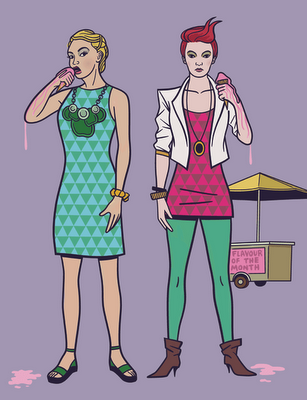
Why is it that, like the proverbial London buses, films seem to come in twos?
There are a whole series of films that came out within a matter of months or even weeks of each other which share oddly similar themes, for example: Dante’s Peak and Volcano [which, incidentally, is graced with the brilliant tag line “The Coast is Toast”]; Deep Impact and Armageddon; Antz and A Bug’s Life; Mission to Mars and Red Planet; The Illusionist and The Prestige; Tombstone and Wyatt Earp; and, one from the old school, Turner & Hooch and K9.
This has to be more than a co-incidence. Whether it is because there is a hot script going round all the studios which gets made by one studio and the others make a similar (but invariably worse) movie, not wanting to miss out, or because they get wind of a rival’s big project, I can’t believe that all these films with similar plots and/or premises just happen to come out in the same year.
The same phenomenon happens in music, but less inexplicably. For example, talking medium term, there is a large market for female singer songwriters at the moment, be they electro-tinged (La Roux and Little Boots), vampy (Paloma Faith), sporting a quiff Morrissey would be proud of (VV Brown), or simply divine (Florence). In the shorter term, there is a glut of singles currently being inflicted upon us which uniformly involve nauseous upstarts committing musical GBH on tracks of varying classic pedigree, of which Lady Sovereign’s “Too Human” is merely the most crude and unforgivable of a terrible bunch, both for being the worst mangling of the best track, and for not even having the common decency to credit it as a cover when it consists of her drivelling over the full track of The Cure’s “Close to Me”.
The reason for trends in music, though, is not hard to discern. Music labels, unlike film studios, have a large number of “products” to flog every year, and so if one artist has a breakthrough, then it’s pretty obvious that other labels will start pushing (and probably signing) artists who sound similar so as to cash in on the “phenomenon”. The more interesting question is whether this active marketing, by labels, radio stations, and advertising executives, drives or is driven by trends in music. I imagine a bit of both; If La Roux’s label sees that Little Boots is doing well then they will probably increase La Roux’s marketing to cash in, which will in turn up La Roux’s profile, and give a popularity boost to similar artists and the whole thing becomes self-perpetuating to an extent.
Obviously at some point it reaches saturation point, and the trend will move onto something else, and suddenly she who was yesterday’s androgynous white-hot-synth-sex-princess is today’s ginger-who-looks-a-bit-like-that-bloke-from-the-Vines. Ho Hum.
Herd Behaviour, or Informational Cascades (or just “jumping on the bandwagon” to you and me) are also well known phenomena in economics. Anyone who watched the news, read a newspaper, or lived outside a rural commune through last autumn and winter will recall the daily litany of terrible financial news, and I’m sure some people will agree with me that it all felt somewhat self-fulfilling. After all, waking up to read “STOCKMARKET CRASHES AS CONSUMER CONFIDENCE FALLS THROUGH THE FLOOR” is hardly conducive to economic joviality.
The fact of the matter is that, on the way up as well as on the way down, the logical thing to is often rendered impossible, or at least very unattractive because everyone else is acting like a herd of rutting wilder beast (the way up), or a chain gang of crazed lemmings (the way down). This is exacerbated by the fact that the herd mentality means that things that were not economic reality before the stampede become so as it continues; for example, a rational investor would hold onto stock during a downturn once it became undervalued, but because no one is acting rationally, the stock gets pushed down far below its value, and rational investors need nerves of steel, and/or the ability to play a long game in order to do the sensible thing and not sell.
This kind of corporate herd behaviour is fairly harmless in the media, but becomes more troubling in areas of life where the worst case scenario is far worse than simply being incarcerated in a culture where one is repeatedly music-boarded by N-Dubz versions of “Lovecats”. Worse in financial terms at least.
Leave a comment